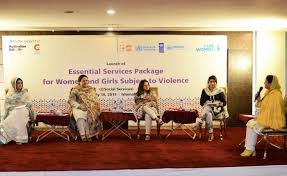UN Women launches ESP

Islamabad: UN Women on Tuesday launched the Essential Service Package (ESP) in order to ensure that quality social services are provided to women and girls subject to violence in Pakistan.
Essential Services Package is a global joint programme of the United Nations on essential services for women and girls subject to violence. The aim of this programme is to provide greater access to a coordinated set of essential and quality multi-sectoral services for all women and girls who have experienced gender-based violence.
In Pakistan, ESP is being implemented through collaboration between UN Women, UNFPA, WHO, UNDP and UNODC. UN Women, being the global lead agency for social services to victims and survivors of violence launched this programme in Pakistan with a key focus on social services.
The programme identifies essential services to be provided by the health, social services, police and justice sector stakeholders as well provide a set of guidelines to improve coordination of essential services in Pakistan.
Australian Deputy High Commissioner, Brek Batley, and Director General Federal Ministry of Human Rights, Muhammad Hassan Mangi were the guests of honor of the event which was attended by government officials and civil society representatives from the national and provincial levels.
A panel discussion on localizing ESP in the provincial context with regard to social services was arranged with Ms. Aliya Shahid, Secretary Women Development Department Sindh, Saira Atta, Secretary WDD Balochistan, Kaneez Fatima, Chairperson Women Protection Authority Punjab, and RukhshandaNaz, first female Ombudsperson Khyber Pakhtunkhwa, as panelists. Head of UN Women KP Sub-Office Zainab Qaiser Khan moderated the panel discussion.
While addressing the event, Brek Batley commented that, “Women and girls have a right to live free from violence. But until that right is realised, they need support. Australia is proud to be one of the founding donors of the Joint UN Essential Services Package programme in Pakistan. This commitment of AUD 4.5 million, across 10 pilot countries, will help improve the quality of services provided to survivors of violence.”
Muhammad Hassan Mangi stated that, “Ending violence against women and girls is a high priority area of the Government of Pakistan. The Ministry of Human Rights is committed to incorporate the Convention on the Elimination of all Forms of Discrimination Against Women (CEDAW) recommendation and that is the reason we have CEDAW committees in all provinces. An effective coordination mechanism is very important for a robust referral system to assist victims of violence. The government is taking capacity building measures to make this system stronger and effective.” He also emphasized the importance of effective legislation and implementation of laws to end violence and make social services accessible for victims.
Earlier in her welcome address, Deputy Country Representative UN Women Pakistan, Aisha Mukhtar formally welcomed the audience and expressed gratitude to the Government of Australia for supporting ESP in Pakistan along with the other nine pilot countries.
Aisha Mukhtar mentioned that, “We know how difficult it is for survivors to have access to high quality services including health, justice and policing, and social services including shelter homes/Dar ul Amans (DuA). We also know that the most challenging part of GBV response services is the weak coordination between different sectors that makes a survivor’s journey more difficult. ESP is all about enhancing GBV survivors’ access to a coordinated set of multi-sectoral services including social services, justice and policing, and health.”
“Today we are starting with social services and will have a combined consultation with representatives of all sectors for effective implementation of global guidelines and protocols in Pakistan.”
Aisha acknowledged the strong commitment of the government partners and dedicated efforts to end violence against women through legislation, service delivery, awareness-raising and advocacy. She said, “We not only have laws to protect women from violence but also the infrastructure to respond to cases of violence through shelter homes/DuA.”
This is one of the reasons why Pakistan was selected as one of the ten global pilot countries for roll out ESP. Other pilot countries includeCambodia, Solomon Islands, Kiribati, Peru, Vietnam, Tunisia, Mozambique, Egypt, and Guatemala. Through the generous support from the Governments of Spain and Australia, the Joint Programme is supporting the pilot countries to develop or adapt quality standards and guidelines for the provision of essential services to survivors, as well as enhancing the capacity of service providers.
Mukhtar concluded the discussion by mentioning, “The launch of the ESP Flagship Programme brings Pakistan one step closer in fulfilling its National and International commitments to ending Violence Against Women and Girls and accelerating progress towards achieving the targets set out in the SDGs and other international commitments.”





